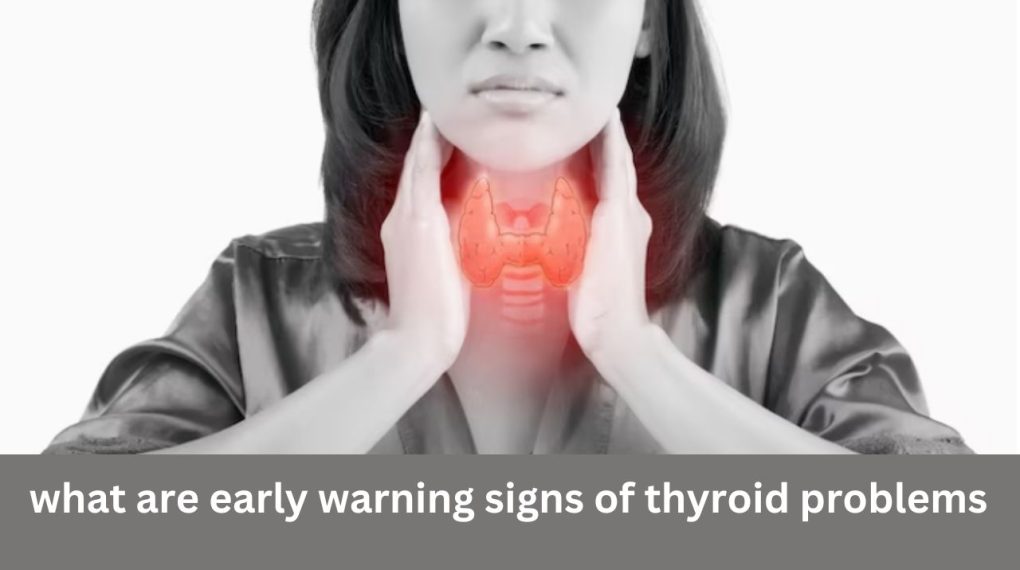Thyroid Health Insights: What Are Early Warning Signs of Thyroid Problems?

Thyroid problems refer to the conditions that affect the thyroid gland, a butterfly-shaped gland located in the front of the neck. This small yet powerful gland plays a crucial role in regulating numerous bodily functions, including metabolism, energy production, and hormone balance. However, thyroid problems are not uncommon, and they can manifest through various symptoms and signs. Recognizing the early warning signs of thyroid problems is essential for timely diagnosis and treatment. By being aware of these indicators, individuals can seek medical attention promptly and effectively manage thyroid conditions. In this article, we will explore what are early warning signs of thyroid problems, allowing individuals to be proactive in maintaining their thyroid health.
What Are Early Warning Signs Of Thyroid Problems?
Thyroid problems can manifest through a variety of symptoms, and the specific signs experienced may depend on whether the thyroid is overactive (hyperthyroidism) or underactive (hypothyroidism).

Different Types of Thyroid Disorders
The thyroid gland is susceptible to various disorders that can disrupt its normal functioning. Here are some of the different types of thyroid disorders:
Hypothyroidism
This condition occurs when the thyroid gland fails to produce sufficient thyroid hormones, leading to a slowdown in bodily processes. Hashimoto’s thyroiditis, an autoimmune disease, is a common cause of hypothyroidism.
Hyperthyroidism
Hyperthyroidism is characterized by an overactive thyroid gland that produces an excessive amount of thyroid hormones. Graves’ disease, an autoimmune condition, is the most common cause of hyperthyroidism.
Thyroiditis
Thyroiditis refers to the inflammation of the thyroid gland, which can be caused by viral or bacterial infections. It can lead to temporary hyperthyroidism followed by hypothyroidism as the thyroid gland heals.
Goiter
A goiter is an abnormal enlargement of the thyroid gland. It can occur due to iodine deficiency, autoimmune diseases, or nodules within the thyroid gland.
Thyroid nodules
Thyroid nodules are growths or lumps that form within the thyroid gland. While most nodules are benign, some may be cancerous. They can cause hyperthyroidism or hypothyroidism depending on their functionality.
Thyroid cancer
Thyroid cancer occurs when abnormal cells in the thyroid gland multiply and form a tumor. There are different types of thyroid cancer, including papillary carcinoma, follicular carcinoma, medullary carcinoma, and anaplastic carcinoma.

Some Common Symptoms Associated With Thyroid Problems:
Hyperthyroidism symptoms:
- Unexplained weight loss
- Rapid or irregular heartbeat
- Increased sweating
- Tremors or shaking hands
- Anxiety, irritability, or nervousness
- Difficulty sleeping
- Increased sensitivity to heat
- Changes in bowel patterns, such as diarrhea
- Fine, brittle hair
- Bulging eyes or eye irritation (in Graves’ disease, an autoimmune disorder)
Hypothyroidism symptoms:
- Fatigue and low energy levels
- Weight gain or difficulty losing weight
- Cold intolerance
- Dry skin and hair
- Constipation
- Muscle weakness or aches
- Depression or mood swings
- Memory problems or difficulty concentrating
- Menstrual irregularities
- Hoarse voice
Methods of Testing for Thyroid Issues
When diagnosing thyroid issues, healthcare professionals employ various tests to assess the functioning and health of the thyroid gland. Here are the common methods used for testing thyroid disorders:
Blood tests: Blood tests are widely used to measure the levels of thyroid hormones and thyroid-stimulating hormone (TSH). TSH is produced by the pituitary gland and stimulates the thyroid to produce thyroid hormones (T3 and T4). Abnormal levels of these hormones can indicate thyroid dysfunction.
Thyroid ultrasound: An ultrasound uses sound waves to create images of the thyroid gland. It helps identify the size, shape, and structure of the gland, as well as detect any nodules or abnormalities. Ultrasound is particularly useful in evaluating the nature of thyroid nodules and determining if further testing or treatment is necessary.
Thyroid uptake and scan: This test involves the administration of a small amount of radioactive iodine or a similar substance. It helps evaluate the size, shape, and function of the thyroid gland. By tracking the uptake of the radioactive substance by the thyroid, the test can identify areas of overactivity (hyperthyroidism) or underactivity (hypothyroidism).
Fine-needle aspiration (FNA) biopsy: If a nodule is discovered in the thyroid gland, a fine needle is used to extract a tissue sample for examination. This biopsy helps determine if the nodule is benign or cancerous.
Thyroid function tests (TFTs): TFTs measure levels of TSH, T3, and T4 in the blood to assess overall thyroid function. These tests provide valuable information about the functioning of the thyroid gland and aid in diagnosing specific thyroid disorders.
Imaging tests: In some cases, additional imaging tests such as CT scans or MRI scans may be utilized to get a more detailed view of the thyroid gland and surrounding structures. These tests are typically conducted when there is a suspicion of more complex thyroid conditions or to assess the extent of any thyroid-related complications.
The specific testing methods used may vary depending on the symptoms, medical history, and initial examination of the patient. Healthcare professionals determine the appropriate tests based on individual circumstances to make an accurate diagnosis and develop an effective treatment plan.

Treatment Approaches for Thyroid Conditions
-
Thyroid surgery
In some cases, surgical intervention may be necessary. Partial or total thyroidectomy involves the removal of all or part of the thyroid gland. It is commonly performed in cases of thyroid cancer, large goiters, or when other treatments are ineffective or not suitable.
-
Beta blockers
Beta blockers, such as propranolol or atenolol, may be prescribed to manage the symptoms of hyperthyroidism. They help control heart rate, tremors, and anxiety associated with excessive thyroid hormone levels.
-
Radiofrequency ablation or ethanol ablation
These minimally invasive procedures involve the use of heat or ethanol injection to destroy thyroid nodules, typically when they are causing symptoms or are suspicious for cancer.
-
Lifestyle changes
Making certain lifestyle modifications can support overall thyroid health. This may include adopting a balanced diet, managing stress levels, regular exercise, and ensuring adequate iodine intake (if applicable).
-
Regular monitoring and follow-up
For both hypothyroidism and hyperthyroidism, regular monitoring of hormone levels and symptom evaluation is essential to ensure the effectiveness of treatment and make any necessary adjustments.
Are there any specific symptoms of thyroid problems in children?
Thyroid problems in children can present with specific symptoms. In the case of hypothyroidism, children may experience delayed growth, fatigue, dry skin, constipation, and a hoarse voice. On the other hand, hyperthyroidism in children can manifest as rapid weight loss, increased appetite, restlessness, and tremors. It is important for parents to be aware of these signs and consult a healthcare professional if they suspect their child may have a thyroid issue. Early diagnosis and appropriate treatment can help manage thyroid conditions effectively and support the child’s overall growth and development.

When should I see a doctor if I suspect thyroid issues?
You should see a doctor if you suspect thyroid issues:
- Persistent symptoms
- Family history of thyroid disorders
- Physical changes like an enlarged thyroid gland or bulging eyes
- Fertility and pregnancy concerns
- Medication adjustments
Conclusion
In conclusion, recognizing the early warning signs of thyroid problems is crucial for timely diagnosis and effective management of thyroid disorders. The keyword “what are early warning signs of thyroid problems” underscores the importance of awareness and vigilance in identifying potential thyroid issues. By paying attention to symptoms such as unexplained weight changes, fatigue, mood swings, and changes in skin and hair, individuals can take proactive steps to seek medical attention and receive appropriate treatment, ultimately improving their overall health and well-being. Timely detection and intervention can make a significant difference in managing thyroid problems and preventing potential complications, highlighting the significance of knowing and acting upon these early warning signs.
Frequently Asked Questions
Q1: What causes thyroid disorders?
Ans: Thyroid disorders can be caused by autoimmune diseases, iodine deficiency, genetic factors, or certain medications.
Q2: Is thyroid disease hereditary?
Ans: There is a genetic component to thyroid disorders, and a family history increases the risk of developing them.
Q3: Can thyroid problems be cured?
Ans: Depending on the specific condition, thyroid problems can often be effectively managed and controlled with proper treatment.
Q4: What are the long-term complications of untreated thyroid disorders?
Ans: Untreated thyroid disorders can lead to cardiovascular problems, infertility, osteoporosis, and mental health issues.
Q5: Can thyroid disorders cause weight gain?
Ans: Hypothyroidism can cause weight gain, while hyperthyroidism can lead to weight loss or difficulty in gaining weight.